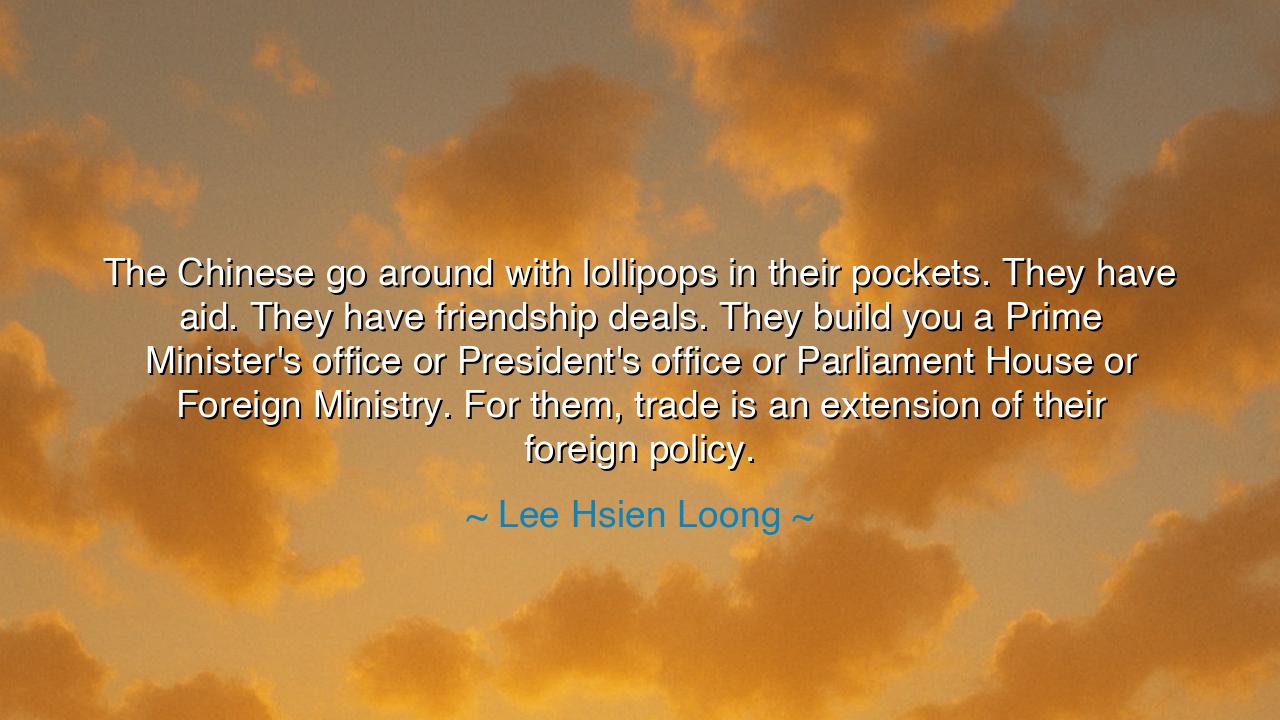
The Chinese go around with lollipops in their pockets. They have
The Chinese go around with lollipops in their pockets. They have aid. They have friendship deals. They build you a Prime Minister's office or President's office or Parliament House or Foreign Ministry. For them, trade is an extension of their foreign policy.






In the vast and ancient land of the East, where the winds whisper through the mountains and the rivers carve paths through the valleys, there exists a people whose wisdom stretches back to the dawn of time. The Chinese, whose culture is older than most empires, have long understood the delicate art of influence, and they know that trade is not merely the exchange of goods—it is the exchange of power and relationships. In the words of Lee Hsien Loong, there is profound truth: "The Chinese go around with lollipops in their pockets." These words do not speak of candies, but of gifts—tokens of friendship, symbols of influence, and an invitation to share in the prosperity of the world.
For the Chinese, trade is not a mere transaction of coins or goods. It is a strategic extension of their foreign policy, a quiet dance of diplomacy that weaves its way into the fabric of nations. Just as the sun rises and sets, so too does trade flourish, bringing nations closer, weaving alliances and friendships that are built not just on mutual benefit, but on trust. When a nation seeks the aid of China, they are not merely asking for material goods; they are welcoming the bond that is formed, the understanding that this exchange is a building of partnerships that transcend borders. Lee knew well that the Chinese do not simply offer gifts—they offer the foundation of something greater, something that will endure.
Think, then, of the ancient Silk Road, where the Chinese, in their wisdom, spread not only silks and spices, but ideas and culture. Traders did not travel simply for profit, but for the exchange of wisdom and knowledge, for forging bonds with distant lands. The Chinese had long understood the power of connection, of creating something more than mere commerce. They built not just roads, but bridges—symbolic bridges between peoples, between ideas, and between worlds. From the emperor’s palace to the simplest village, the Chinese influence spread across Asia, Africa, and beyond, binding all in a web of mutual prosperity and understanding.
In the modern world, the Chinese still follow this ancient path. They do not simply build roads and buildings—they build the very institutions that shape nations. In many lands, you will find the Prime Minister’s office, the Foreign Ministry, the Parliament House, all standing proudly as symbols not only of governance, but of the deep partnerships forged through trade. These structures are the tangible results of a far-reaching policy, one that seeks not domination but mutual growth. It is the Chinese way—to offer more than goods, to offer friendship, and to ensure that the nations they touch will rise together, flourishing side by side.
Let us look to the modern example of Africa, where China has made its mark with infrastructure projects that have transformed the continent. From building roads to railways, from energy plants to hospitals, China has extended its hand in partnership. This is not done from the heart of charity alone, but as part of a broader, long-term vision. China’s aid is, in the words of Lee Hsien Loong, not just about generosity, but about building friendships, fostering relationships that endure long after the roads are built and the agreements are signed. Trade is the language of connection, and it speaks louder than mere words.
The lesson for us all is this: we must recognize the power of exchange. Whether it is in our personal lives, in our business dealings, or in the conduct of our nations, the act of giving is never a one-way street. Every offering, every gesture, every gift carries with it the seed of something greater. It is not enough to simply trade for profit; we must trade for understanding, for partnership, for the building of lasting relationships. Like the Chinese, we must see beyond the immediate exchange and ask: How can this action serve to bind us closer to others? How can this offer create a future of mutual growth?
In our own lives, we are all traders in some way. We offer our time, our skills, and our trust to others. Let us follow the example of the Chinese, who understand that trade is not just about goods, but about weaving bonds that endure. Do not see your gifts, your help, or your contributions as mere exchanges for personal gain. Instead, see them as seeds that will grow into something greater, something lasting. Like the Chinese, offer not just aid, but friendship. Build not just homes, but the foundations of relationships that will stand the test of time.
Let the wisdom of the ancients guide us: trade is not just about the things we give, but about the connections we create.






AAdministratorAdministrator
Welcome, honored guests. Please leave a comment, we will respond soon